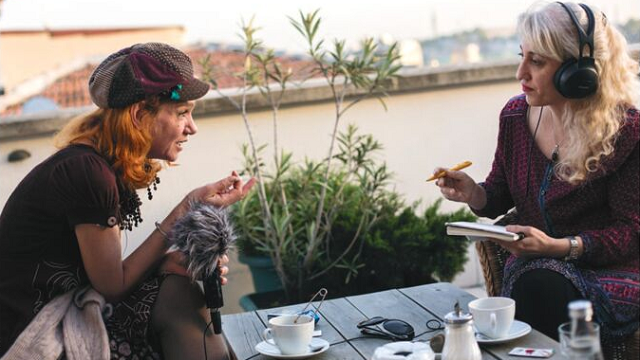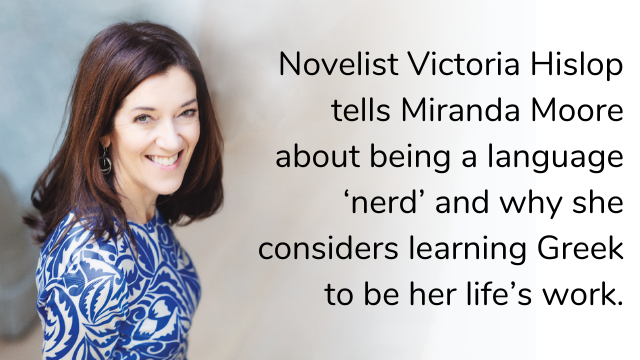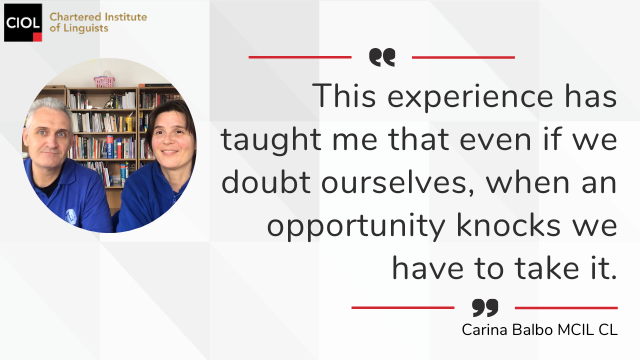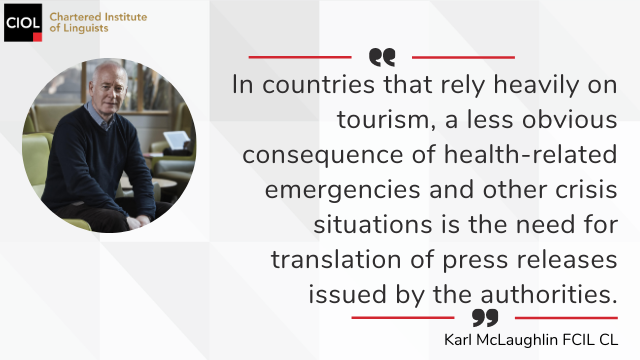-
QUALIFICATIONS
- For Linguists Worldwide
- For UK Public Services
- Preparation
- Policies & Regulation
-
MEMBERSHIP
- Join CIOL
- Membership grades
- NEW for Language Lovers
- Chartered Linguist
- Already a member?
- Professional conduct
- Business & Corporate Partners
-
ASSESSMENTS
- For Second Language Speakers
- English as a Second Language
-
TRAINING & EVENTS
- CPD, Webinars & Training
- Events & Networks
- CIOL Mentoring
-
NEWS & VOICES
- News & Voices
- CIOL eNews
- CIOL Awards
- The Linguist
- Jobs & Ads
-
RESOURCES
- For Translators & Interpreters
- For Universities & Students
- Standards & Norms
- CIOL & AI
- APPG
- In the UK
- UK Public Services
- Find-a-Linguist
Six podcasts for language lovers
Inspiration, intrigue, advice – whatever you’re looking for in a podcast, CIOL staff, volunteers and members have it covered.
The Allusionist is the podcast for language nerds. When it began, it primarily focused on exploring English lexicon, etymology, idioms, slang and more. Over time, Helen Zaltzman’s “adventures in language” have evolved to embrace languages from all around the world (including fictional ones), as well as language-related subjects such as translation, audio description and accents.
With different experts for each episode, topics range from the whimsical (one answers the question ‘Why do we all sound like idiots when we talk to babies?’) to the topical (another discusses the language used by the press to talk about migration), and everything in between. New episodes of 20-60 minutes come out roughly every fortnight. So whatever mood you’re in, you are sure to find an episode as silly, serious, long or short as you like. Zaltzman’s comedic flair means that even the nerdiest episodes are entertaining and digestible. I find myself chuckling along frequently to her witty comments and unashamed zeal for all things word-related.
Anam Zafar Student Member, Editorial Board
I am a bit late to the game when it comes to podcasts – I find the choice quite overwhelming. My language combination is English-Spanish, and lockdown gave me the nudge to find a Spanish-language podcast. I am drawn to Latin American stories because that’s where I learned the language.
Produced by Radio Ambulante Studios, it is a free podcast lasting 30 minutes. With a new release every Friday, the team of international journalists cover interesting stories and events from Latin America, delving into politics, science, economics and the natural world. Some of the accents are quite strong, so it is suitable for intermediate, advanced or fluent Spanish speakers who want to learn more about Latin America.
Recent episodes include ‘Bolivia después de Evo’, ‘Confinados con 1.800 vecinos’ and ‘El huracán lo llevamos dentro’. El hilo is a great way to learn about global issues, people and events that aren’t necessarily on the radar of UK-based news outlets.
Fiona Baillie Student Affiliate, Scottish Society Committee
Have you ever wondered whether linguistics could be livened up using snippets of show tunes, cartoons and vintage adverts? Neither had until I started listening to Lexicon Valley, a podcast hosted by John McWhorter, Associate Professor of English and Comparative Literature at Columbia University.
In its own words, the podcast is “about language” and covers a huge range of topics, from linguistic history (‘Why Is “Ph” Pronounced That Way?’) to sociolinguistics (‘From Uptalk to Vocal Fry, Women are Prolific Language Innovators’) and the grammar of both English and other languages (‘Chinese Has No Grammar, Right? Wrong!’).
I won’t need to convince you that these are things worth learning about in and of themselves, but the tone in which the information is delivered – academically rigorous yet refreshingly light, and occasionally downright irreverent – is what makes this podcast one of my favourites. The topics are eclectic but fascinating and the style whimsical but insightful. I thoroughly recommend it.
David Stockings Career Affiliate
From the linguists Gretchen McCulloch and Lauren Gawne, this is one of my favourite podcasts. Gretchen focuses on the language of the internet and is the author of bestseller Because Internet: Understanding the new rules of language. Lauren’s interest is how people speak and she runs the generalist linguistics website Superlinguo.
With a new 30-minute episode every month, they have released 50 podcasts since launching Lingthusiasm three years ago. Subjects include language learning, translation and constructed languages (e.g. Esperanto). One standout episode is ‘How Languages Influence each Other’, exploring African languages through an interview with Hannah Gibson, who reveals unusual details (did you know that Swahili has 16 grammatical genders?). I also loved the one about the way people integrate emojis with words.
The hosts explore various interesting topics. Their style is direct, fun, friendly, enthusiastic and passionate – as if you are having coffee with friends and talking about language!
Panayiota Vatikioti MCIL
In my favourite podcast, David Edmonds and Nigel Warburton interview top philosophers on a wide range of topics. Since launching the podcast in 2007, they have written and produced an enormous range of endlessly fascinating content, including two very successful books based on the series.
As well as discussing ethics and aesthetics, Philosophy Bites covers language, psychology and the philosophy of mind, with some great episodes for lovers of language and linguistics. Three of these which set me thinking were Guy Longworth on J L Austin and Ordinary Language, which argues that when it comes to language, context is everything; Barry Smith on Wittgenstein’s Conception of Philosophy, which covers the argument that language is necessarily shared; and Joshua D Greene on the Construction of Thought, exploring areas in the left temporal cortex and suggesting they may be a subject-object-verb ‘structure’ in the brain. Language is what makes us human; Philosophy Bites explores that and more with precision and erudition – a joy!
John Worne, CEO
A Way with Words is a really funny podcast focusing on languages. The two co-hosts – American writer and radio presenter Martha Barnette and American lexicographer Grant Barrett – discuss all things related to languages with callers from across the world. From complex questions about grammar, literature and linguistics to entertaining ones concerning slang, dialects, expressions, jokes and riddles, the podcast is a fun way to relax. In one episode the discussion centred on whether the term ‘bloody’ is offensive. It was amusing to stop and think about the connotations of this word, which is so popular in Britain.
Accessible to all generations, the podcast is especially useful to those who are studying English as a foreign language and want to learn all kinds of linguistic titbits. I’ve always wondered why we say what we say, and how certain expressions came into English. Barnette and Barrett give answers to such questions and enable listeners to discover new things. It’s a must for language lovers!
Alexandra Man, CIOL Qualifications Development Officer
More
The Chartered Institute of Linguists (CIOL), Incorporated by Royal Charter, Registered in England and Wales Number RC 000808 and the IoL Educational Trust (IoLET), trading as CIOL Qualifications, Company limited by Guarantee, Registered in England and Wales Number 04297497 and Registered Charity Number 1090263.








